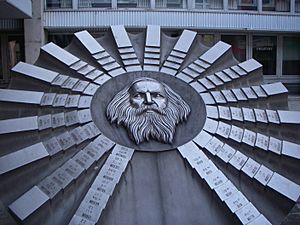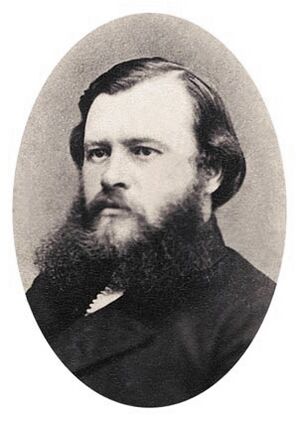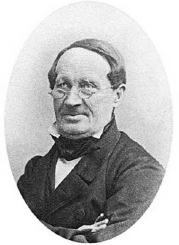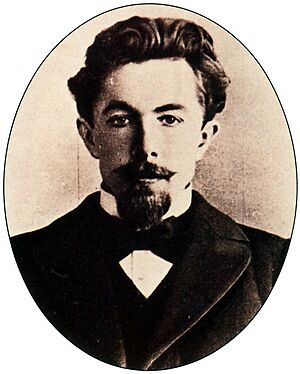List of Russian chemists facts for kids
This article tells you about some amazing Russian chemists and material scientists. These are people from Russia, the Soviet Union, and other earlier Russian states who made big discoveries in chemistry. Chemistry is the study of what things are made of and how they change. These scientists helped us understand the world better, from how medicines work to how new materials are made!
| Top - 0-9 A B C D E F G H I J K L M N O P Q R S T U V W X Y Z |
Amazing Russian Chemists and Their Discoveries
Pioneers of Chemistry
Many Russian chemists helped create the science of chemistry as we know it today.
Founders and Key Thinkers
- Mikhail Lomonosov (1711–1765) was a true genius! He was a scientist, writer, and artist. He helped start the idea of physical chemistry, which mixes physics and chemistry. He also studied glass and proved that the phlogiston theory (an old idea about burning) was wrong. He was even the first to record freezing mercury.
- Nikolay Beketov (1827–1911) invented aluminothermy, a way to get metals from their ores using aluminum. He also helped start the field of physical chemistry.
- Aleksandr Butlerov (1828–1886) was a founder of organic chemistry, which is the study of carbon-based compounds. He discovered hexamine and formaldehyde. He also showed how double bonds work in chemical structures.
- Dmitri Mendeleyev (1834–1907) is one of the most famous chemists ever! He invented the Periodic table of chemical elements. This table organizes all the known elements and even helped him predict elements that hadn't been discovered yet. He also invented pyrocollodion, a type of smokeless gunpowder.
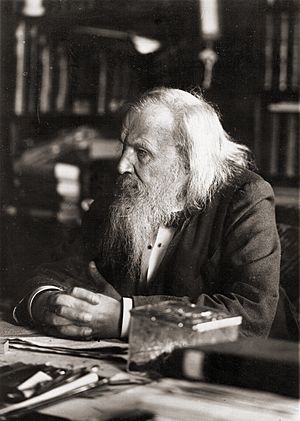 Mendeleyev invented the Periodic Table.
Mendeleyev invented the Periodic Table.
Understanding Materials
- Dmitry Chernov (1839–1921) helped create modern metallography, which is the study of metal structures. He discovered that metals can change their structure (called polymorphism) and created a diagram showing how iron and carbon mix.
- Evgraf Fedorov (1853–1919) was the first to list all 230 ways that crystals can be arranged. This was a huge step in founding modern crystallography, the study of crystals.
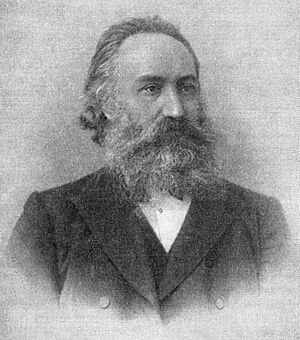 Fyodorov studied crystals.
Fyodorov studied crystals. - Mikhail Shultz (1919–2006) was a physical chemist who helped create the theory behind glass electrodes, which are used to measure how acidic or basic a liquid is.
Inventors and Innovators
Russian chemists have invented many things that we use every day.
Everyday Inventions
- Ernest Beaux (1881–1961) was the inventor of Chanel No. 5, a very famous perfume.
- Constantin Fahlberg (1850–1932) invented saccharin, which was the first artificial sweetener.
- Sergei Lebedev (1874–1934) invented polybutadiene, which was the first type of synthetic rubber that could be made and sold easily. This was very important for tires and other rubber products.
- Aleksandr Loran (1849–1911) invented fire fighting foam, which is used to put out fires, especially those involving oil.
- Nikolay Zelinsky (1861–1953) invented the activated charcoal gas mask used in Europe during World War I. This mask protected soldiers from dangerous gases.
Industrial and Scientific Breakthroughs
- Vladimir Ipatieff (1867–1952) was a founder of petrochemistry, which is the study of chemicals from petroleum (oil). He invented the "Ipatieff bomb," a special container for high-pressure chemical reactions.
- Vladimir Shukhov (1853–1939) was a brilliant inventor who created chemical cracking, a process that breaks down heavy oil into lighter, more useful fuels like gasoline.
- Ivan Knunyants (1906–1990) invented poly-caprolactam, a type of nylon. He also helped develop the chemistry of fluorocarbons.
- Igor Gorynin (1926–2015) invented special titanium and aluminium alloys that are very strong and can resist radiation. These are used in many important industries.
- Salambek Khadzhiyev (born 1941) is a petrochemist who specialized in making special petroleum fuels and changing hydrocarbons using zeolites.
Discoverers of Chemical Reactions
Many chemists are known for discovering new chemical reactions.
- Aleksandr Arbuzov (1877–1968) discovered the Arbuzov reaction, an important reaction in organic chemistry.
- Alexander Borodin (1833–1887) was not only a chemist but also a famous composer! He discovered the Borodin reaction and helped discover the Aldol reaction.
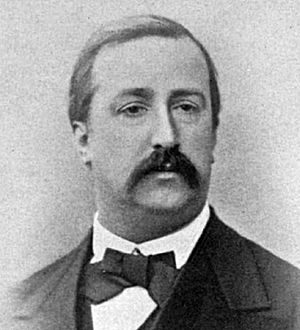 Borodin was a chemist and composer.
Borodin was a chemist and composer. - Aleksandr Dianin (1851–1918) discovered Bisphenol A, a chemical used in plastics, and Dianin's compound.
- Alexey Favorsky (1863–1945) discovered the Favorskii rearrangement and Favorskii reaction.
- Vladimir Markovnikov (1837–1904) is famous for Markovnikov's rule, which helps predict how certain chemical reactions will happen. He also discovered naphthenes.
- Sergey Reformatsky (1860–1934) discovered the Reformatsky reaction.
- Alexander Zaitsev (1841–1910) is known for Zaitsev's rule, another important rule in organic chemistry.
Nobel Prize Winners
Some Russian chemists have won the Nobel Prize for their incredible work.
- Pyotr Kapitsa (1894–1984) won the Nobel Prize in Physics for his work on superfluidity when studying liquid helium.
- Andre Geim (born 1958) and Konstantin Novoselov (born 1974) won the Nobel Prize in Physics for inventing graphene, a super-thin and super-strong material. They also developed "gecko tape," which sticks like a gecko's foot!
- Ilya Prigogine (1917–2003) won the Nobel Prize in Chemistry for his work on how complex systems change over time.
- Nikolay Semyonov (1896–1986) won the Nobel Prize in Chemistry for his theory of chain reactions, which explains how many chemical processes happen, like explosions or burning.
Other Notable Chemists
- Karl Ernst Claus (1796–1864) was a chemist and botanist who discovered the element ruthenium.
- Boris Belousov (1893–1970) and Anatol Zhabotinsky (1938–2008) discovered the Belousov–Zhabotinsky reaction. This is a special chemical reaction that creates amazing patterns and colors that change over time, showing how complex systems can behave.
- Mikhail Tsvet (1872–1919) was a botanist who invented chromatography. This is a powerful method used to separate different chemicals from a mixture. It's used in many areas, from medicine to forensics.
- Paul Walden (1863–1957) discovered the Walden inversion, a key concept in organic chemistry, and ethylammonium nitrate, which was the first ionic liquid that stays liquid at room temperature.
Images for kids
See also
- List of chemists
- List of Russian scientists
- List of Russian inventors
- Science and technology in Russia
Black History Month on Kiddle
Famous African-American Civil Rights Activists
 | Roy Wilkins |
 | John Lewis |
 | Linda Carol Brown |

All content from Kiddle encyclopedia articles (including the article images and facts) can be freely used under Attribution-ShareAlike license, unless stated otherwise. Cite this article:
List of Russian chemists Facts for Kids. Kiddle Encyclopedia.

